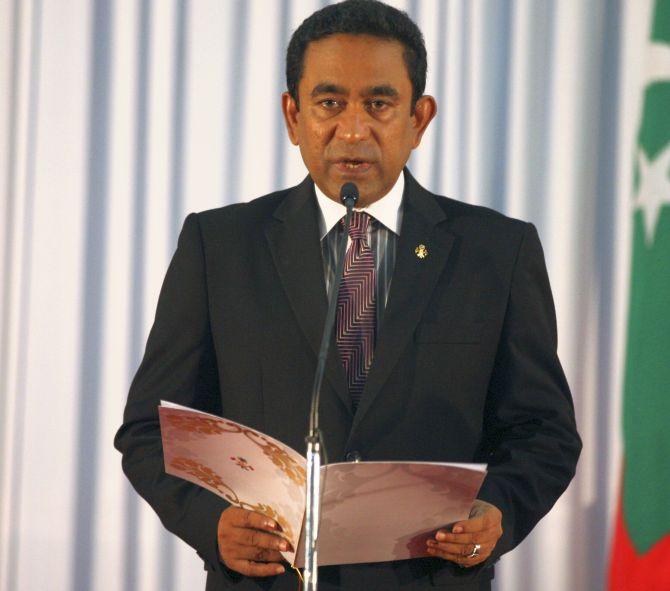 | « Back to article | Print this article |
'Of course, Maldives is chicken feed for the Indian armed forces. And an intervention in the Maldives may serve the purpose of creating jingoism in an election year.'
'But from the foreign policy perspective, any such move will be a flagrant violation of international law and the UN Charter,' warns Ambassador M K Bhadrakumar.

IMAGE: Maldives President Abdulla Yameen. Photograph: Waheed Mohamed/Reuters
The prescriptive, partisan and provocative approach that South Block took -- for reasons that are best known to the Indian establishment -- over the developments in the Maldives has suffered an embarrassing rebuff.
The MEA press release on February 2 virtually demanded a certain course of action by the Maldivian government with regard to its domestic politics. (The word used was 'imperative', which harks back to the colonial era and gunboat diplomacy.)
It was an unsolicited intrusion into that country's internal affairs.
Unsurprisingly, President Abdulla Yameen coolly ignored Delhi's diktat and instead declared his rejection of the Maldivian supreme court ruling.
On Tuesday, February 6, Yameen went public with the allegation that what is happening is the outcome of a deep-rooted plot to overthrow him from power. He has promised to go to the bottom of the conspiracy and lay it bare for public view.
One doesn't have to be a rocket scientist to figure out that Yameen may well have a point -- how the unholy alliance between the two former presidents who were sworn enemies (Maumoon Abdul Gayoom and Mohamed Nasheed) might have come about and how external forces would have worked behind Chief Justice Abdulla Saeed (who was, by the way, an appointee of Nasheed when he was president in 2009) to behave so impetuously and unconstitutionally.
In retrospect, Delhi should not have rushed into judgment.
Such unseemly haste can only create misperceptions regionally and internationally (and in the Maldives) that Delhi is promoting some sort of 'regime change' agenda.
And an unsavory reputation will do no good to India's influence in the region, since other South Asian capitals are closely watching the happenings in Male.
The second pronouncement by South Block on February 6, which suo moto, has an ominous ring to it. The tone is somewhat confrontational.
One can only hope that Delhi will not compound the mistake already committed by wading into the Maldivian morass through a direct intervention.
Of course, Maldives is chicken feed for the Indian armed forces. And an intervention in the Maldives may serve the purpose of creating jingoism in an election year.
But from the foreign policy perspective, any such move will be a flagrant violation of international law and the UN Charter.
Therefore, unless and until there is a formal request from Yameen seeking Indian help and/or intervention, which is highly unlikely under the circumstances, Delhi should hold fire.
It is one thing to hope and pray that Yameen whom South Block has annoyed by its rude statement somehow walks into the sunset (and, of course, is succeeded by Nasheed who is 'our man' in the Arabian Sea) but it is another thing to do something coercive on the ground to make it happen physically.
In retrospect, Delhi's approach should have been ditto what Beijing has taken. The foreign ministry spokesman said in Beijing today, 'China has been closely following the situation in the Maldives. We hope various parties of the Maldives will properly resolve differences through dialogue and negotiation, resume the normal order as soon as possible and maintain national and social stability.'
'We believe the Maldives government, political parties and people have the wisdom and capabilities to cope with the current situation independently. We have asked the Maldives to continue to take effective measures to faithfully guarantee the security of Chinese personnel, institutions and cooperative projects in the Maldives.'
The bottom line is that the Maldives is a sovereign country and a member of the United Nations. Any rash move can come to haunt India for a long time to come and tarnish our country's image and reputation.
The fact of the matter is that the Maldives (a country with a population of just 4 lakhs) is the archetypal underdog in the SAARC, and will receive sympathy.